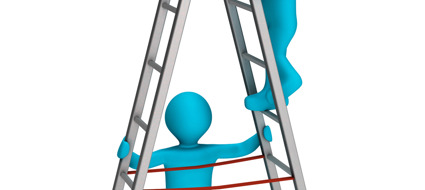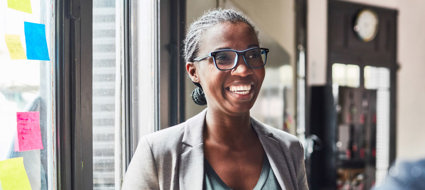Organisational resilience
Published:
Claire Williams, a Research and Development Officer at Research in Practice delves into materials and resources on organisational resilience and wellbeing and how they can be used in practice.
Claire Williams, Research and Development Officer at Research in Practice delves into materials and resources on organisational resilience and wellbeing, and how they can be used in practice.
Talking points
This podcast looks at:
- What organisational resilience is and why it’s important for wellbeing.
- Some tools and resources on organisational resilience that you can use.
- Research in Practice’s future work in this area.
[Introduction]
This is a Research in Practice podcast, supporting evidence informed practice with children and families, young people, and adults.
Phil: Welcome to the Research in Practice podcast. I'm Phil John, Events Technical Officer at Research in Practice. In this podcast, we will be delving deeper into organisational resilience and wellbeing. I'll be talking to Claire Williams who led a recent event on this. Claire, can you introduce yourself, please?
Claire: Yes, hi there, Phil. I'm Claire and I'm one of the Research and Development Officers at Research in Practice. One of the topics that I lead on is organisational resilience and wellbeing, so I'm going to have a little chat with you about it today.
Phil: Fantastic, so what can we expect from the podcast today? What points are we looking at?
Claire: What we'll think about is, well, we'll think about what organisational resilience is and why it's important for our wellbeing. We'll look at some of the tools highlighted in the regular session that we put on and then we'll also have a look at some of the resources available on the topic and I'll probably talk a little bit about our future work in this area as well.
[What organisational resilience is and why it’s important for wellbeing]
Phil: Fantastic. Great, so to kick off then, can you tell us more about organisational resilience? What is it and I guess who does it affect?
Claire: Organisational resilience can mean different things to different people, so I suppose what the research says from a person called Greer back in 2016, they talk about resilience as, 'An individual's ability to manage environmental difficulties, demands and high pressure'. It's that inner strength bouncing back. It doesn't mean that people don't experience trauma or distress or that someone doesn't feel pain or sadness, but it does mean that we're able to cope with it. When we think about that phrase, 'wrapped in cotton wool', that, kind of, makes sense because if you don't go through anything that's potentially negative, you're never going to, sort of, build those resiliences that make you stronger.
Phil: Ok.
Claire: My partner is a physio and I relate this to what he always says about broken bones because he always talks about how resilient our bones are because they don't look the same when they're healed, but they're actually loads stronger. We don't always look the same. You know, we might feel differently about things, but we're building that strength. I also think, you know, we need to be really clear that it isn't, definitely isn't about putting up with more stuff and, you know, we should be frustrated and sad and angry about things that go wrong and about problems in the system. We should remain affected by things that make us angry or sad, but it's our ability to cope with them and move on.
Phil: Individuals ultimately though, they reach a point where individual resilience tops out effectively, so where in terms of organisations, where can they step in to support people to be resilient? What's the role of leaders and managers in this?
Claire: Well, this is the key thing really, Phil. You're bang on the money there. I think, you know, we do have a limited capacity to be individually resilient. We need to create those conditions to support resilience and that is a really, really important role for leaders and managers. Practitioners can't just go and be resilient on their own and that can also lead to some poor definitions of resilience thinking about, you know, putting up with poor situations. As part of the SWORD [Social Work Organisational Resilience Diagnostic] workbook and SWORD project, which I'll talk to you a little bit about later, where they talk about a systemic model of having broad organisational resilience which needs emotionally literate leaders, resilient teams and then resilient individuals. The key is that it's a priority in organisations for managers and leaders to focus on wellbeing and resilience to ensure that those conditions are right for people to work and they feel supported and they feel like they can do their best work being supported by their managers.
Phil: The SWORD process takes them through those areas then presumably? Is that in order to build and maintain organisational resilience effectively?
Claire: Yes, so I'll tell you a little bit about the SWORD. This was a Change project which involved some wonderful academics, Professor Gail Kinman and Dr Louise Grant. We developed the Change project, also we co-produced it with leaders and managers in social care. This really looked at what makes social care workers resilient and how organisations can and should support this and what challenges are that worker's resilience. Over the course of the Change project, we identified five key features of resilient organisations and these are a secure base - now this is where the organisation really offers that sense of protection, belonging and being valued and cared for and it fosters that culture of mutual support, but also constructive and supportive challenge. Then there's sense of appreciation and that's where workers really feel valued and that their individual talents and skills are, you know, really appreciated.
Also, leaders are visible and approachable and really listen and engage with workers. Then also learning organisation. That's where beliefs, goals, everything, objectives are underpinned by a shared set of values and behaviours. Then the space to reflect and then challenges provide, like, learning opportunities rather than attributing blame if something goes wrong. The fourth one is mission and vision and that's where leaders are really good at their communicating. They're committed to this clear mission vision and they consult with staff and motivate people and change is managed really constructively, especially during times of uncertainty in the organisation. Then these four principles are basically underpinned by the fifth principle which is wellbeing, and this is where leaders and managers really pursue a deep commitment to wellbeing. They reduce stress and make sure working conditions are really improved. Things like reasonable adjustments are made, support workers in ways to suit their circumstances and preferences amongst other things. Then there's also some golden threads, Phil.
Phil: Golden threads? Ok.
Claire: Golden threads. I love a golden thread. These are key features that are really embedded in a healthy organisation. These are things like trust, communication, managing change, cultural literacy and emotional literacy. To explain what SWORD is, it's a really interesting diagnostic tool which is designed under these five principles. It has a survey which organisations can participate in. We’ll receive their data to see how well their staff are feeling in their organisation. Then the leaders can then respond by looking at the tasks and strategies in the workbook to, sort of, make sure they're listening to the staff in their organisation and they're following up by doing some of the tasks and strategies to support them in really building that culture of resilience and wellbeing within their organisation.
Phil: Fantastic, and this all leads to, kind of, a sense of self-efficacy and agency and believing as an individual what you're doing is important and that you're being supported, that kind of thing?
Claire: Yes, definitely.
Phil: Ok, so, I mean, talking of importance then, I mean, if you were to meet someone and had to explain and they were, like, 'Ok, there's SWORD and there's this,' but why is organisational resilience important? How would you explain that to someone?
Claire: This is really important so I would say the key thing is we can't really support other people if we don't look after ourselves. The key message we always talk about in our sessions is using the flight analogy. If you're on an aeroplane, there's usually, like, a safety announcement that tells you to fit your own oxygen mask before you fit your child's mask or someone else who might need support. Usually, our first instinct is to help others, but the advice on an aeroplane goes to the contrary of that and it tells you to look after yourself first. There's a really good reason for that because we can't help other people unless we're able to breathe properly ourselves.
Phil: Yes, yes, that makes sense.
Claire: Far from being selfish, we have to secure our oxygen mask before we help others. I think that's really, really relevant to social care because we're doing emotionally challenging stuff. Things that, you know, can be a really difficult situation sometimes and we need to build that resilience to really look after ourselves so that we have the oxygen and the resilience to really do our job to the best we can.
Phil: That's a great analogy for, you know, for the importance of organisational resilience. Then practically, are there other ways that, like, for the example can lead to retention of staff?
Claire: Yes, definitely, so things like if you look after your staff and people feel looked after, supported, that they're able to do their job really well, then that 100% will feed into your, sort of, retention and, you know, recruitment strategy. We work a lot with North Yorkshire. They basically run the SWORD. A wonderful service manager, Sam Clayton, is the head of quality assurance at North Yorkshire. They always talk about how they use the SWORD really regularly as part of that recruitment and retention strategy. They regularly use it and they can monitor their progress over the years. I think they're on their fourth run. It's actually currently open and they're using it within their organisation as we speak.
Phil: That's brilliant, yes.
Claire: It definitely feeds into those broader strategies. If you can create those conditions, people are going to be happy in their roles. They're going to feel like they can do their jobs well, which is really, really important.
[Some tools and resources on organisational resilience that you can use]
Phil: Yes, it's great to hear because often when, you know, you can talk about toolsets and methodologies and the like, but it is. The proof's in the pudding, isn't it? It's actually in the delivery of these things and these things have been set up in order to make a difference rather than to be something that you would read about and just tick off. On that, could you tell up about some of the work, well, some of the exercises I guess because you've been running sessions, haven't you in relation to this?
Claire: Yes.
Phil: I think it would be useful to, kind of, dip into that if you would like to, to share some of what you've been doing with the exercises and tools.
Claire: Yes, so we do a regular session, so the last one was in September and there's another two planned for 2024. These are just, like, one-hour lunchtime sessions. It was a really great session with lots of participation from delegates. We had a look at some of the resources that we have available as part of the membership of Research in Practice, and we use a few of the tools in that session. First, what we did, we did a bit of an icebreaker relating to this, kind of, idea of hope and self-efficacy in relation to resilience. Feeling like you're doing a really good job and that, kind of, really helps bolster wellbeing. I asked delegates to share what last gave them a sense of achievement in their role and there were loads of great answers.
Phil: Right.
Claire: It was great and a lot of it was around, sort of, positive feedback from a person they're supporting which is a really lovely thing. Seeing positive outcomes for families. You know, really seeing that they're actually making a difference. Developing positive relationships with a family that they're supporting. That's a really lovely thing. Another one was sharing knowledge of best practice to support others. That idea of learning organisation in the SWORD, it's, like, people really value that, sort of, being able to share knowledge and help others along the way as well. There were a couple of others that said supporting a relationship between a young person and a foster carer. Really seeing that you're making a difference and you're really, sort of, bringing something to the young person or the adult's life that you're supporting. You know, people do their job in this sector because they're really passionate about that difference they make to people's lives and it really came through in that session.
Phil: What a great way to kick things off as well with an icebreaker like that. It's a great start, kind of, to channel some positive stuff, but not just for the sake of being positive. Again, it's actually the experience, you know, and I think that's really important. That's great. Then were there some other exercises as well?
Claire: Yes, we did quite a few. There's one exercise that we did which is called Be Your Own Best Friend. Trying to get everyone to be their own best friend because we're often now… this is from, I've mentioned Professor Gail Kinman already, who is one of our gurus of wellbeing and resilience and she's written for us our Supporting Practitioner Wellbeing Guide and this is one of the exercises in there. The exercise is about comparing two different approaches. So, the first one is imagine that a close friend is having difficulties or suffering in some way, and how would you respond to them. So, thinking about how, you know… particular attention paid to the tone in which you usually talk to your friends. And, then, the other approach is think about when you've had difficulties yourself or are suffering in some way, and how you respond to yourself, and noting the tone in how you, kind of, talk to yourself in those difficult situations.
And, it was a really useful little exercise to get thinking about why we often treat ourselves differently to others. So, we often are a lot more, you know, caring and considerate to other people, and we often feel embarrassment or shame about things we do ourselves. And, it's about thinking about how you use those skills that you use as being a friend to somebody, and how you support your friends, and actually really applying them to how you look after yourself as well.
Phil: Yes. I mean, that's a really important message, isn't it? And, it almost goes back to the analogy of the oxygen mask on the flight, because unless you've got your thinking straight or are being kind to yourself… it's not really thinking, but just, like you say, being kind to yourself is very difficult, or you can compromise yourself, I suppose, a little bit, if that makes sense?
Claire: Yes, definitely. So, that was a really, really useful exercise, and people did, you know, come back and say, 'Oh, I never really thought about it like that.' And, you know, it was really useful for them to look at it from a different perspective, yes. And, then, a couple of other things we looked at, so we did a bit about work-life balance, and this is another webinar by Gail Kinman. Sorry, Gail. She's done a lot of work for us around this area, which is wonderful. And, we asked people to identify things that they do to, sort of, switch off from work, and they shared lots of different things in the chat, and they talked about time with friends, family, pets. I can relate to that. I spend a lot of time with my dog, outside of work. And, thinking about planning holidays, you know, all sorts of activities.
Phil: Yes, that's a good one.
Claire: Yes, and yoga. Someone actually said, 'Taekwondo,' which I thought was interesting.
Phil: I've never tried it. And I was rubbish at judo, and I didn't look back.
Claire: And, then, someone also said “A gong sound bath,” which I would be interested to find out more about.
Phil: A gong sound bath?
Claire: Yes.
Phil: That's fantastic. But, that's not something we offer at Research in Practice quite yet, is it?
Claire: No, unfortunately we don't provide those. Yes, so lots of really nice things. What do you do, Phil, to switch off from work?
Phil: Well, one of the best things I ever did, and still do, and it happened by accident really… I don't know why I did this, but during the lockdown, and I'm fortunate where I live to have countryside around me a little bit, I decided to take up running. Well, I went for a run and it didn't go very well, and then my wife suggested, because she is wise about these things, 'Well, why don't you do the Couch to 5k?' And, to cut a long story short, it's, kind of, three years later and I find that just really good for my mental wellbeing. And, it's obviously probably doing something for my bodily health as well. But, it just is fantastic for that, because everything just goes out of your head really, when you're, kind of, struggling to keep going along a course. But, it is very good for just… and also just for setting you up for the day, or perhaps after your day.
I mean, I prefer to go running in the morning, but, you know, it's all of these things that… it's going back to that being kind to yourself, allowing. And, it's not always easy with family, and work, and all of those things, but if you can earmark some time for yourself, you know? If you can breathe from the oxygen mask yourself first, you know, which I keep coming back to as an analogy because I think it's a really good one, and I think yes, all to the good. But, that sounds great…
Claire: I did the same actually, in lockdown. I started doing Yoga with Adriene. I think a lot of people did. Like, she's obviously an American YouTube star, but she's great actually. You know, it got me into doing more Yoga, and Pilates, and that kind of thing in general, and looking after myself. So, it was really useful. But, because you couldn't go out of the house, I found it interesting that I'd finish work and then to transition from my work day into the night, before I started cooking tea or doing whatever we were doing in the evening, I would do, like, half an hour of Yoga with Adriene between. And, it, sort of, really helped me switch into the next part of the day, and focus on a bit of…
Phil: Yes. Yoga's a lot about breathing as well, isn't it?
Claire: Yes, relaxing and breathing. Some of them are a bit more, you know, of a workout, but some of them you can just do a lot of lying down and breathing, which is nice too, sort of, minding your balance.
Phil: My watch now tells me to breathe sometimes. I mean, I don't know quite what kind of support it thinks I need, but I think it's actually part of an exercise, which is something that you can do, can't you? I mean, of course we all can breathe, but I mean in terms of that, kind of, using breathing as a mindfulness technique, you know, just taking a long breath in through the nose and out through the mouth a couple of times, sometimes that can be really useful, you know, before…
Claire: Oh my God, I don't think I realised how much a good deep breath can actually make you feel better within, you know, a short space of time. Like, I feel like now I'm in my middle-age years, or so, I feel like it wouldn't be something that I would've really thought about as a young person, but now I do spend a lot of time with a cup of tea, looking out the window, having a nice deep breath, and I do feel like it definitely improves my day.
Phil: No, it's not because you're older, it's just because you're wiser. I bet that's what it is.
Claire: Oh, well, yes. A bit of both probably.
Phil: And, then, so, talking about wisdom, and I'm going to try and fold this back in, what resources does Research in Practice have around organisational resilience and wellbeing that you want to make people aware of?
Claire: Yes, we've got loads of really good resources. We've got a workshop which you can access as an online learning package, and that is on supporting resilience in social care teams, so it's quite a broad one. This workshop is really valuable for both, you know, individual practitioners, and supervisors, and leaders, and managers, and really offers those evidence-informed tools which can support policies and practices, and really promote staff wellbeing. So, I think in that workshop we look at, like, the concept of personal emotional resilience, like we talked about, that individual resilience, and the organisational conditions that can support this, and think about some of the techniques and tools that support wellbeing at work, and also some personal self-care strategies and things like that, and thinking about work-life balance. So, it'll go into some of the things we've talked about today in a lot more detail.
We've also got various briefings. So, we've got a leading with compassion strategic briefing, which is really helpful if you're in a supervisory or leadership position. So, thinking about how you can, sort of, bring wellbeing and resilience into supervising people, and making sure that they're feeling well, and whether there's anything they need, and thinking about if they're doing alright, so they can do the best they can possibly do in their role.
Then, we've also got a strategic briefing on supporting wellbeing remotely, because now a lot of us are working from home or remotely, and it's thinking about those things. So, when I talked about the SWORD earlier, and this idea of a secure base, which is having your colleagues around you really, and especially if you're doing a challenging role, you can come back after maybe having a difficult conversation with somebody in your role, like, you can come back to the office or to the shared space, where you can, sort of, talk to your colleagues and get that support you need. And, I think this is very different now in our current time, because a lot of people working remotely don't necessarily have colleagues around them. So, this offers some really good tips around how we, kind of, build that secure base in a different type of way, while all working from home, and some good tips and strategies focusing on leaders and managers, to make sure they're thinking about their staff in that way.
Then, we've got all sorts of bits and bobs really, quite a few blogs and various things. And, then, I've obviously mentioned the wellbeing guide that Professor Gail Kinman wrote for us, around supporting practitioner wellbeing. So, this is really useful, like, thinking about building a toolbox that you can use to support your self-care, thinking about how you repair from when you've had a difficult time, or maintain your wellbeing, or even grow and really sustain, yes, that positive mental health and wellbeing.
So, I'm sure we'll link all of these excellent resources underneath our recording of this podcast, Phil?
[Research in Practice’s future work in this area]
Phil: Yes, we'll be sure to include all the links that you mentioned today in the episode's show notes, so don't you worry about that. That will all be there, yes. The information will be below the podcast that you're listening to today. Looking to the future then, what else is happening with organisational resilience, in terms of Research in Practice and the working guidance, that we'd love to share?
Claire: Yes, so we've already talked about our recurring sessions on organisational resilience and wellbeing, so we're going to be doing one in June and in December. So, definitely get signed up to those. It's only an hour, but over lunchtime, and you can bring your lunch and just have a little session there where you can learn a bit about resilience. And, we also have a topic on recruitment and retention, which is being led by my wonderful colleague, Alison Domakin, and she's updated me on some of the resources that we're going to be putting out. So, I think there's going to be some resources around how you meet the needs of neurodiverse staff in you organisation, so maybe some webinars and filmed resources around that, and then also supporting the needs of international social workers in your organisation as well, and thinking really about the retention crisis, how we support practitioners, who are experienced, to stay in their roles, you know…
Phil: Very important, yes.
Claire: Yes, really important. And, then, there are a few other bits. I think they're going to be doing a recruitment and retention briefing, which is an old one that they're going to update, for leaders and managers as well. And, I'm sure there'll be lots more other bits and bobs on that. The SWORD is actually currently being developed to be a much bigger diagnostic tool which is going to be used across all of health and social care. So, yes, it's currently being designed. At the moment, it's a survey that you send out a link to organisations and they participate, but it's going to be a web application which all Research in Practice partners will have access to as part of their membership. So, they'll be able to use the SWORD a couple of times a year, look at their data. It'll all be a lot more accessible. It will be a really, really good resource for leaders in organisations to, sort of, think about wellbeing and resilience in their role.
And, then, I think we've also got a really exciting contract which has been funded by the Department for Education. So, we're going to be working with King's College, Essex County Council, and I'm sure a team of skilled associates. This work is around research which found out that two thirds of children's practitioners feel that workload is too high, and the main focus of this is a workstream on retention, and we're going to develop and produce some resources to support employers to adhere to the social worker employer standards. So, we'll be supporting local authorities to meet these standards, by developing some tools there as well. So, that's something to, sort of, watch this space for. We'll have lots more resources around recruitment and retention in the coming year, really building on what we've done with the SWORD over the last few years. So, you know, really taking it into the next stage.
Phil: Yes, fantastic, and great, great work to be doing, and very, very important work to be doing. So, thank you very much, Claire, for taking some of your time to talk through organisational resilience. And, we hope you enjoyed our little chat today and that you will dive in and have a look at some of the tools and resources that we discussed. So, thank you to everyone listening. Please do share any feedback that you have on the podcast with us, particularly around Research in Practice, so that we can best support you and your organisation moving forward. Thank you very much.
[Outro]
Thanks for listening to this Research in Practice podcast. We hope you've enjoyed it. Why not share with your colleagues and let us know your thoughts on X (formerly Twitter) @researchIP and LinkedIn.
Reflective questions
- How do you feel about your own personal resilience?
- Are there any areas that you need support with, and are there any resources discussed in this podcast that you might use as a starting point?
- What do you think about your organisational approach to resilience?
- Are there resources and support available that you could draw upon or are there areas you feel could be improved?
- Are there opportunities in your role where you can discuss your wellbeing and provide feedback on organisational approaches to resilience and wellbeing such as individual supervision, peer coaching / group supervision or team meetings?
Resources that are mentioned in this podcast
- Greer, J. (2016) Resilience and personal effectiveness for social workers. SAGE Publications.
- Developing resilience in North Yorkshire: how the Social Work Organisational Resilience Diagnostic (SWORD) has been used to support practice.
- Leading with compassion: Supervisors' Briefing.
- Recovery, work-life balance, wellbeing: how to switch off.
- National Workload Action Group.
- NHS Couch to 5K.
- NHS breathing exercises for stress.
- The Social Work Organisational Resilience Diagnostic (SWORD): Video learning resource.
- Social Work Organisational Resilience Diagnostic.
- Supporting wellbeing remotely: Leaders' Briefing.
- Supporting practitioner wellbeing: Practice Guide.
- Yoga with Adriene.
Professional Standards
PQS:KSS - Organisational context | Developing excellent practitioners | Shaping and influencing the practice system | Emotionally intelligent practice supervision | Creating a context for excellent practice | Designing a system to support effective practice | Developing excellent practitioners | Support effective decision-making | Organisational context
CQC - Caring | Safe | Effective
PCF - Contexts and organisations







